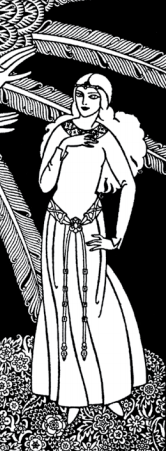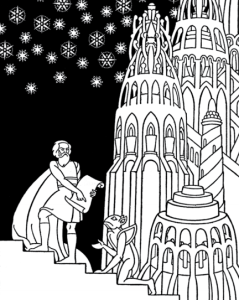You Should Be Playing…
Polaris
Long ago, the People were dying at the end of the world. But hope is not yet lost, for you still hear this song of the stars. And so it was that brave Knights, fresh to the fight, rallied forth against a horde of demons to protect the People lost in rapture at the dawning and terrible Sun. The light of the Stars dimmed in its baleful radiance, and slowly, the line was pushed back and back. Once again, the brave Knights beat back the demonic horde, as the hateful Sun began to gambol back toward the horizon and Autumn began, but the line was deeper. The cost was higher. It has been this way since the beginning, and soon, it shall be the ending.
 Polaris is a storytelling game of chivalric heroes and inevitable tragedy set against a backdrop of the mythic past. Written by Ben Lehman in 2009 and released by These Are Our Games, Polaris can be a difficult game to find in print. Neither Amazon.com nor DrivethruRPG has the title in stock. Luckily, electronic copies can be secured through the These Are Our Games website. The retail value of the hard copy is $23, and the electronic copy has a requested donation of $10 before downloading.
Polaris is a storytelling game of chivalric heroes and inevitable tragedy set against a backdrop of the mythic past. Written by Ben Lehman in 2009 and released by These Are Our Games, Polaris can be a difficult game to find in print. Neither Amazon.com nor DrivethruRPG has the title in stock. Luckily, electronic copies can be secured through the These Are Our Games website. The retail value of the hard copy is $23, and the electronic copy has a requested donation of $10 before downloading.
Polaris is set in a mythic Earth, so long ago that not even the stories of the time remain. At the very top of the world, under the light of the North Star, the city of Polaris was populated by the People. The People were beautiful, graceful, and pure, united under the rule of the King Polaris and the nameless Snow Queen. The time before the Dawn was filled with poetry and songs, pageantry and tournaments, seemingly without end. The end still found them, however, with the first Dawn, and the slow spinning rise of the Sun in the south. The Sun was so beautiful in its light that it swept the People of Polaris into a reverie, and even their King was frozen to gaze upon it. A terrible, unspecified sin led to the destruction of the city of Polaris, and the creation of the Mistake. Even as the Sun departed the sky above the Remnants of Polaris, the Knights of the Stars knew it would return, and with it would come the demons of the Mistake.
The world created by Lehman is compelling and rich. Rooted firmly in the mythic cycles of Europe, Polaris feels instantly familiar to anyone who has read the stories of King Arthur and Charlemagne. The description of the world itself is very enjoyable to read, and the pace of the storytelling is almost intoxicating. It is recommended for every player at the game to have read at very least the first page of the introduction, and it’s very helpful for them to have read the setting in its entirety. The artwork of the book as well assists with the mood established by the text, presenting a consistent style highly reminiscent of other mythic texts. Polaris succeeds in creating its own mythic world filled with heroism and tragedy, and an understanding of both is central to the game.
Gameplay
 Character creation is somewhat restrictive, but it is very much a cooperative process. The game is designed for four players, but it contains variant rules for playing with less or more. It is not recommended, however, as the rules very much focus on the idea of a recurring group of four sitting in the same relative positions around the table.
Character creation is somewhat restrictive, but it is very much a cooperative process. The game is designed for four players, but it contains variant rules for playing with less or more. It is not recommended, however, as the rules very much focus on the idea of a recurring group of four sitting in the same relative positions around the table.
Unlike most role-playing games, there is no Game Master (in the base rules), and each player at the table shares in the responsibility of telling the story. Each player creates their own Protagonist, who begins the narrative as a fresh knight filled with Zeal. As the Protagonist fails in their action, shows weariness in their cause, or any number of triggers, they roll for Experience. As the Protagonist grows more experienced, their Zeal lowers as their Ice and Light attributes increase. Eventually, Zeal is replaced by Weariness, which tracks the Protagonist’s decline. The story of a Protagonist can only end while they have Weariness, and then they ultimately either die or become a villain. There are no other outcomes.
Game play is a handled as a series of narrative negotiation among players. The creator of the Protagonist is considered to be the Heart, guiding their actions and story. The player opposite the Heart takes on the role of the Mistaken, guiding the characters and forces that oppose the Protagonist. The players to the left and right of the Heart act as the New Moon and the Full Moon, guiding the supporting characters to the Protagonist’s narrative, and serving as referees in conflicts between the Heart and the Mistaken. In character creation, each Moon and the Mistaken are assigned at least one character who will be central to the Protagonist’s world.
Key phrases, such as “It was not meant to be…” or “But only if…”, are used by the four players to negotiate the events of a scene. The session itself must begin with the phrase “Long ago, the People were dying at the end of the world…” and ends with, “But that all happened long ago, and now there are none who remember it.” While key phrases can take a bit to become familiar with, they quickly build on each other. As the introduction provides a sense of framing narrative, the narrative itself develops through the key phrases into something players can take ownership of. The ultimate goal of a game of Polaris is to tell a meaningful and moving story for all the players involved, and players are encouraged to be aggressive in their narrative, making decisions for both their characters and others in the scene. The key phrases are structured as means of saying “Yes, but…” in various different ways. Only in the event of a genuine conflict between the Heart and the Mistaken will dice be rolled, or when a Protagonist shows Experience.
“It Was Not Meant To Be”
Play passes around the table, as each player is given a turn to be the Active Player, serving as the Heart for their Protagonist. In this manner, the negotiation aspect of the narrative grows stronger, as previous victories and losses can guide a player in future actions. Ultimately, this allows each player to act as both the Heart and the Mistaken, keeping the power of each role firmly in balance. Only the Heart and the Mistaken have the power to use the key phrases, and they have the ultimate sway over the characters they are tied to. After a Protagonist loses their Zeal and is replaced by Weariness, the Heart and the Mistaken gain the power to end the Protagonist’s story. The Mistaken can negotiate for the end of the world, whereas the Heart can negotiate for the death of the Protagonist. For either to come to pass, the terms must be accepted by their counterpart. Protagonists who are not killed or cause the end of the world eventually reach a level of Weariness where they Fall and become a demon.
 The stories told by Polaris are inevitably tragic, and players are encouraged to embrace this. Each player knows from the starting point that their Protagonist is not going to end well. In many ways, this can be a freeing experience, as players are allowed to explore the many ways in which classical heroes are destroyed, whether in a blaze of glory, or one final, terrible betrayal, or any number of ways in between.
The stories told by Polaris are inevitably tragic, and players are encouraged to embrace this. Each player knows from the starting point that their Protagonist is not going to end well. In many ways, this can be a freeing experience, as players are allowed to explore the many ways in which classical heroes are destroyed, whether in a blaze of glory, or one final, terrible betrayal, or any number of ways in between.
Polaris is a challenging game that requires a level of trust and experience in a gaming group to truly tell. It is a game about flawed heroes with noble intentions being torn down by the weight of the world and ultimately broken by impossible tasks. In the process, it evokes all the emotions of classical myth, with surging highs and terrible lows. Myths have endured long past the societies that created them due to the truths they have to say about the human condition, and because their archetypes are compelling. Polaris is a game about making your own myths, and there are no other games that do it better.
But that all happened long ago, and now there are none who remember it.
And that is why you should be playing Polaris.
David Gordon is a regular contributor to the site. A storyteller by trade and avowed tabletop veteran, he is always on the lookout for creative tabletop games. He can be reached at dave@cardboardrepublic.com.
You can discuss this article and more on our forums!
Photo Credits: Illustrative work by Boris Artzybasheff; Polaris Logo by These Are Our Games.
